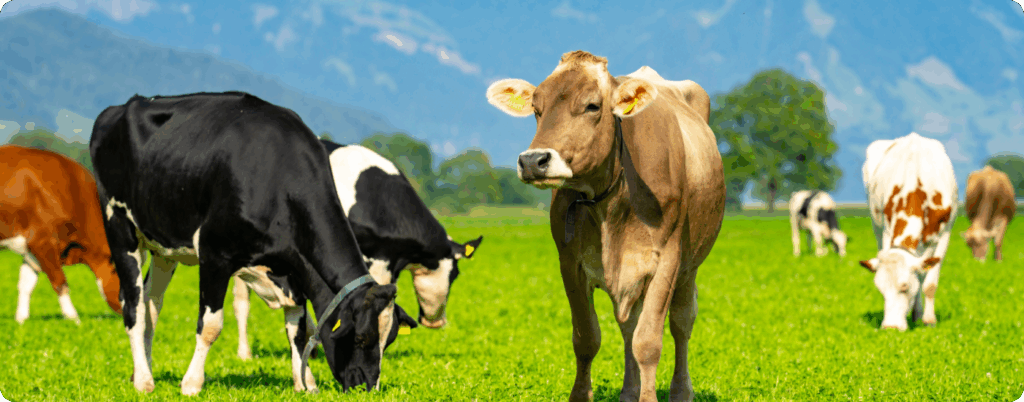PLEASE NOTE: The information in this blog is for educational purposes only. It is not a substitute for professional medical advice. Consult your healthcare provider if you’re seeking medical advice, diagnosis, or treatment.
Dairy products have been a treasured part of the human diet for thousands of years, thanks to their versatility and nutritional value. Yet today, many people are choosing to avoid dairy entirely in favor of nut milks and other alternatives. For some, this is due to lactose intolerance, animal welfare concerns, or digestive discomfort.

Recent scientific research has revealed that the issue might not always be related to lactose but could instead stem from a specific protein variant found in most commercial milk.
Thanks to these findings, one alternative is gaining major attention from health-conscious individuals, athletes, and those still looking to enjoy dairy the old-fashioned way. That alternative is A2 milk.
What is A2 milk? In this blog, we’ll explore the answer to this question as well as its potential benefits, where to find it, and why it’s surging in popularity worldwide.
What is A2 Milk?
A2 milk is naturally occurring and has essentially the same nutrient composition as conventional milk options, but it does not contain A1-beta casein (1).
Casein is the primary protein found in mammalian milk, accounting for approximately 80% of the total protein content. This protein exists in several different forms, with beta-casein being one of the most significant variants that directly impacts how milk affects human digestion and health.
About 30% of the protein in cow’s milk comes from beta-casein, which has two variants: A1 and A2 (2). Conventional cow’s milk found in your local grocery store contains both A1 and A2, but A2 milk only contains the A2 variant of beta casein protein (3).
Unlike cows, which can contain A1 or A2 proteins, milk from animals such as sheep, goats, and buffalo only provides the A2 form of the beta-casein protein (4). Human breast milk also mainly offers A2 beta-casein, suggesting a compatibility between A2 milk and human digestive systems.
To better understand what is A2 milk, let’s explore the key differences between A1 and A2 milk.
A1 vs A2 Milk: What’s the Difference?
The difference between A1 and A2 milk mainly revolves around structure, digestibility, and the origin of the animals.
Structure
The key difference between A1 protein and A2 protein lies in a single amino acid substitution at position 67 of the beta-casein protein chain (5, 6). While both variants contain 209 amino acids, A1 milk contains histidine at this critical position, whereas A2 milk contains proline.
Digestibility
During the digestive process, A1 beta-casein releases a peptide called beta-casomorphin-7 (BCM-7), which doesn’t occur with A2 beta-casein digestion (7). For some individuals, BCM-7 may lead to inflammation, digestive discomfort, and symptoms similar to lactose intolerance (8).
This critical difference explains why many individuals who experience problems with conventional milk consumption notice improvements when switching to A2 milk.
Breed Origins

A1 dairy mainly comes from Holstein Friesian cattle, while many indigenous breeds from Asia and Africa, along with certain European breeds like Guernsey and Jersey, naturally produce A2 beta-casein (9).
5 Impressive A2 Milk Benefits
A1 dairy can still be incredibly beneficial, but A2 dairy offers some unique benefits compared to its more popular counterpart. These potential benefits include:
1. Improved Nutrient Density
Cow’s milk is a rich source of protein and fat, along with key vitamins and minerals such as calcium, magnesium, zinc, vitamin A, and B vitamins (10, 11). A2 dairy options like goat and sheep milk offer impressive nutrient profiles.
Goat milk is packed with essential nutrients like vitamins A, C, and E, along with higher levels of calcium, phosphorus, and magnesium compared to cow’s milk (12, 13). It also provides bioactive compounds with anti-inflammatory, anti-diabetic, anti-allergenic, and antioxidant properties (14).

Similarly, sheep milk is a powerhouse of proteins, vitamins, minerals, as well as components like lactoferrin and conjugated linoleic acid (CLA) that may improve immune function and help prevent diseases like cancer, diabetes, and obesity (15, 16).
Although it’s less popular, sheep milk has been shown to contain more vitamin A, vitamin E, vitamin B12, zinc, proline, and lactoferrin than cow’s milk (17, 18).
2. Better Digestion
Numerous studies have found that A1 milk consumption is connected to diarrhea, abdominal pain, inflammation, and worsened lactose intolerance symptoms (19, 20). For many, A2 milk is far easier on the gut and easier to digest (even for some people with lactose intolerance)(21, 22, 23).
A study on Koreans found that A2 milk can be a safe and effective option for those who experience discomfort after consuming milk (24). Another study on Chinese preschoolers replaced conventional milk with A2 milk and found improvements in cognitive performance and gut symptoms related to milk intolerance (25).
A2 dairy options, such as goat milk, also offer probiotics and prebiotics that can help protect against allergies and infections and maintain a healthy gut (26).
Uncut Colostrum
Colostrum Powder in Its Purest Form
3. Athletic Performance & Recovery

Although it’s often overlooked in favor of flashy sports drinks, milk is considered one of the best pre- and post-workout beverages thanks to its minerals, proteins, lipids, and amino acids (27). Not only is it incredibly nutrient-dense, but many athletes also find A2 milk easier to digest.
A2 milk has even been found to improve recovery and performance (28, 29).
4. Bone Health
Dairy products can be valuable for bone health throughout all stages of life. Children and adults who avoid dairy are at a higher risk of bone fracture as dairy is a bioavailable source of protein, calcium, and other key nutrients needed for bone health (30, 31).
5. Improved Tolerance
When someone struggles with dairy, it commonly falls into two main categories:
- Lactose Intolerance: This is caused by the absence or reduced activity of the lactase enzyme and may lead to abdominal pain, diarrhea, gas, and other unpleasant symptoms (32, 33).
- Dairy Allergy: While less common than lactose intolerance, dairy allergies impact about 3% of children, yet most overcome this allergy by the age of 3 (34, 35). A milk protein allergy requires the complete elimination of milk.
A dairy allergy and lactose intolerance have similar symptoms leading to confusion (36). Plus, studies have shown that milk intolerance has to do with more than just the presence of lactose. For example, some may actually struggle with A1 beta-casein instead of lactose (37).
Both goat milk and sheep milk, have been shown to be less allergenic than cows milk, making them a potential alternative for those with lactose intolerance or sensitivity to cows milk (38, 39, 40).
Where to Find A2 Milk
If you’re interested in trying A2 milk, there are plenty of options to consider. Once again, A2 milk can come from various animals, such as certain breeds of cattle, sheep, goats, camels, and even water buffalo.

A2 milk is becoming more and more accessible each year and can now be found throughout Europe, the United States, Australia, New Zealand, and dozens of other countries (41). In the US, grocery stores such as Sprouts or Whole Foods also carry a variety of products made with A2 dairy.
One of the best ways to find A2 dairy products is by visiting your local farmers’ market. These markets can be a goldmine for fresh, local, high-quality A2 dairy products like raw milk, cheese, or even soaps.
A2 Milk: Is it Right For You?
Even though dairy is tasty and packed with valuable nutrients, no one wants to deal with diarrhea, gas, or bloating that may occur after consuming it. Although this discomfort is often attributed to lactose intolerance, the real problem may actually be related to a variety of different factors that can be avoided when you choose A2 dairy.
With an impressive nutrient profile, the potential for better digestion, and as a valuable tool for athletes, A2 dairy is emerging as a promising alternative to conventional dairy.
If you’re looking to add to your animal-based diet or simply looking for an easily digestible dairy source, A2 milk can be the perfect choice.
Grass-Fed Whey Protein for Muscle Recovery
1 Ingredient. 24 Grams of Protein.
Subscribe to future articles like this:

